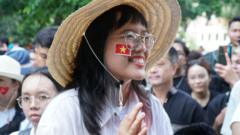In Ho Chi Minh City, on a hot afternoon, 20-year-old college student Tung Linh smiled brightly, noting her unfamiliarity with the intense historical conflicts that shaped Vietnam's past. The descendants of war veterans, like her grandparents, now revel in the peace that allows them to look towards a promising future. As Vietnam commemorates 50 years since the end of the Vietnam War, the nation's dynamic transformation is evident: once a battleground marked by division and violence, it has become a burgeoning economic hub.
Under an authoritarian regime softened by embracing capitalist ideals, Vietnam stands at an economic crossroads, aspiring to mirror China's growth trajectory while also grappling with the repercussions of U.S. trade policies. U.S. tariffs, especially those proposed by former President Donald Trump—potentially surging to 46%—have ignited apprehension among Vietnamese officials and investors alike. This rise in tariffs could deter Vietnam's ambitions to be an integral player in global trade, particularly as it seeks to offset declining opportunities in China.
Despite its fraught history as a French colony and then a proxy battleground for Cold War ideologies, Vietnam's youthful populace—boasting a median age of 33—exhibits an eagerness for education and success. Many college students, like Linh, are pursuing degrees in economics and marketing, hoping to not only advance their own careers but also elevate Vietnam's standing on the world stage. As her peers cheer for soldiers during the commemoration event, there exists an enthusiasm for Vietnam's unity and future, mirroring the spirit of a nation that has largely moved past the traumas of war.
The Vietnamese government has taken steps to streamline its bureaucracy, presenting policies designed to attract foreign investments—an endeavor vital for escaping the "middle-income trap" faced by many developing nations. This transformation has seen an influx of overseas Vietnamese and foreign entrepreneurs, particularly in the lucrative electronics sector, as companies look toward Vietnam as an alternative manufacturing site in light of rising costs in China.
However, the nation's strategic position risks entangling it once again in the geopolitical tussles of the U.S. and China. Recent high-profile visits, such as that of Chinese leader Xi Jinping, demonstrate Vietnam's willingness to maintain amicable bilateral ties with its northern neighbor, despite ongoing tensions in the South China Sea and broader territorial concerns. As the country celebrates its reunification, the overwhelming sentiment is one of aspiration, progress, and the desire for continued peace and cooperation, both domestically and with foreign partners.
While there are lingering scars from the war, exemplified by stories of veterans like Le Thanh Gian, the prevailing narrative is one of hope and reconciliation. "We must have peace," he asserts, emphasizing the need to move forward and work collaboratively with former adversaries for a brighter future. Despite entering precarious scenarios induced by trade negotiations and tariffs, Vietnam remains resolute in its aspiration for a prosperous tomorrow, embracing the complexities of its history while looking ahead.
Under an authoritarian regime softened by embracing capitalist ideals, Vietnam stands at an economic crossroads, aspiring to mirror China's growth trajectory while also grappling with the repercussions of U.S. trade policies. U.S. tariffs, especially those proposed by former President Donald Trump—potentially surging to 46%—have ignited apprehension among Vietnamese officials and investors alike. This rise in tariffs could deter Vietnam's ambitions to be an integral player in global trade, particularly as it seeks to offset declining opportunities in China.
Despite its fraught history as a French colony and then a proxy battleground for Cold War ideologies, Vietnam's youthful populace—boasting a median age of 33—exhibits an eagerness for education and success. Many college students, like Linh, are pursuing degrees in economics and marketing, hoping to not only advance their own careers but also elevate Vietnam's standing on the world stage. As her peers cheer for soldiers during the commemoration event, there exists an enthusiasm for Vietnam's unity and future, mirroring the spirit of a nation that has largely moved past the traumas of war.
The Vietnamese government has taken steps to streamline its bureaucracy, presenting policies designed to attract foreign investments—an endeavor vital for escaping the "middle-income trap" faced by many developing nations. This transformation has seen an influx of overseas Vietnamese and foreign entrepreneurs, particularly in the lucrative electronics sector, as companies look toward Vietnam as an alternative manufacturing site in light of rising costs in China.
However, the nation's strategic position risks entangling it once again in the geopolitical tussles of the U.S. and China. Recent high-profile visits, such as that of Chinese leader Xi Jinping, demonstrate Vietnam's willingness to maintain amicable bilateral ties with its northern neighbor, despite ongoing tensions in the South China Sea and broader territorial concerns. As the country celebrates its reunification, the overwhelming sentiment is one of aspiration, progress, and the desire for continued peace and cooperation, both domestically and with foreign partners.
While there are lingering scars from the war, exemplified by stories of veterans like Le Thanh Gian, the prevailing narrative is one of hope and reconciliation. "We must have peace," he asserts, emphasizing the need to move forward and work collaboratively with former adversaries for a brighter future. Despite entering precarious scenarios induced by trade negotiations and tariffs, Vietnam remains resolute in its aspiration for a prosperous tomorrow, embracing the complexities of its history while looking ahead.

















